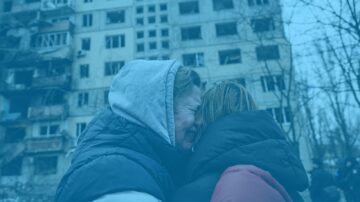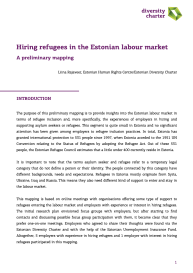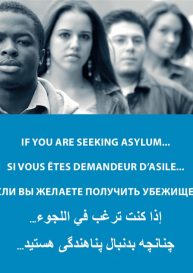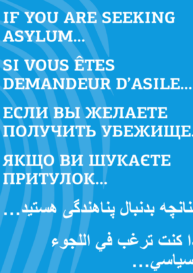
Refugees
In 2022, nearly a million people applied for asylum in the European Union, which is half more than the year before – the number of asylum seekers is almost at the level of the peak of the migration crisis seven years ago. The EU countries, together with Norway and Switzerland, accepted about 966,000 asylum applications last year (623,000 in 2021), announced the European Union Asylum Office (EUAA).
The Estonian Human Rights Centre engages in advocacy efforts related to refugees, which involve providing input on proposed laws and safeguarding the human rights of refugees. Additionally, we collaborate with the UN Refugee Agency (UNHCR) in Estonia as implementing partners, working towards ensuring that the asylum process aligns with international obligations.

Counseling for asylum-seekers and beneficiaries of international protection
Counselling for asylum-seekers and beneficiaries of international protection
Who's who?
It is important to know the necessary terminology used when dealing with asylum seekers and refugees.
- Asylum seeker is someone who says he or she is a refugee, but whose claim has not yet been definitively evaluated. National asylum systems are there to decide which asylum-seekers actually qualify for international protection. Those judged through proper procedures not to be refugees, nor to be in need of any other form of international protection, can be sent back to their home countries. (UNHCR)
- Refugee is a person who is outside their country of origin or habitual residence because they have suffered persecution on account of race, religion, nationality, political opinion, or because they are a member of a persecuted ‘social group’. Refugees have to move if they are to save their lives or preserve their freedom. They have no protection from their own state – indeed it is often their own government that is threatening to persecute them. If other countries do not let them in, and do not help them once they are in, then they may be condemning them to death – or to an intolerable life in the shadows, without sustenance and without rights. (UNHCR)
- Subsidiary protection applies in cases in which law on asylum does not. Deporting this person back to their home country could put them in danger. For example torturing, execution, inhumane or degrading methods of treatment or punishment, or being put into a life threatening situation.
- Human Trafficking is a crime against humanity. It involves an act of recruiting, transporting, transfering, harbouring or receiving a person through a use of force, coercion or other means, for the purpose of exploiting them. Every year, thousands of men, women and children fall into the hands of traffickers, in their own countries and abroad. (UNODC)
- Migrants, especially economic migrants, choose to move in order to improve the future prospects of themselves and their families.
- Illegal immigration is the migration into a country/state in violation of the immigration laws and sovereignty of that country/state. Illegal immigration raises many political, economic and social issues and has become a source of major controversy in developed countries and the more successful developing countries.
People

Uljana Ponomarjova
Lawyer
uljana.ponomarjova@humanrights.ee
Olga Vaarmann
Lawyer
olga.vaarmann@humanrights.ee
Joosep Nahkor
Office Manager
joosep.nahkor@humanrights.ee




